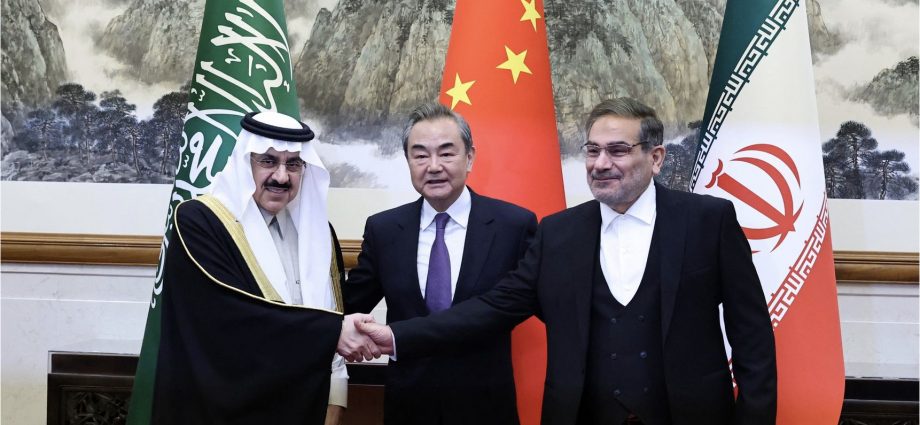
Diplomats and analysts around the world are still trying to decipher China’s stunning diplomatic coup in brokering a peace deal between Saudi Arabia and Iran. Other than the emergence of China with a new and unprecedented role as peacemaker in the Middle East, the most apparent takeaway for the Americans is that the United States is losing its influence in the region and China is quietly taking over its diplomatic leadership role.
China’s success in brokering the deal announced on March 10 is significant in many ways. While people should understand important caveats with the role China played, it is also important to examine Beijing’s strategic intention behind the diplomatic breakthrough and what this could mean for China’s mediation role in other global hotspots going forward.
Despite the grand announcement, details of the deal remain elusive. Iran and Saudi Arabia will re-establish diplomatic relations, but the specifics on the concessions they each made are still largely unknown. It also makes it difficult to discern the extent of China’s involvement as a mediator in the exact issues and proposals that brought the two sides together.
According to one Iranian diplomatic source, Saudi Arabia was the one that reached out to China to facilitate the dialogue during President Xi Jinping’s visit to Riyadh in December. China then conveyed the message during Iranian President Ebrahim Raisi’s trip to Beijing in February. However, it is unclear if China was involved in any substantive proposals during the process as Saudi Arabia and Iran negotiated their individual terms.
It would be disingenuous and exaggerated to call China the “maker” of this peace deal. After all, the Saudi-Iran talks had been going on for some time, most notably in Iraq until the leadership changed in Baghdad last year. China does appear to have acted upon and facilitated the positive momentum between the two, rather than engineered or created it.
Behind the Iran-Saudi agreement is a genuine desire for reconciliation in the region. In a time of global uncertainty and faced with pressing domestic and economic challenges, countries in the region, including both Iran and Saudi Arabia, want to de-escalate tensions.
In this sense, China’s power is in having maintained a relationship with both Iran and Saudi Arabia, rather than its mediation skills. As Iran’s domestic situation continues to deteriorate and external pressures grow, China holds critical leverage as one of the country’s remaining few partners.
Such leverage boosts China’s credibility to check Iran’s behavior in the eyes of Saudi Arabia. China has proven itself as an eager and reliable economic partner of the kingdom in the past decades. The deteriorating relations between Saudi Arabia and the US gives Riyadh more reasons to turn to Beijing.
The Saudi-Iran deal is obviously a major victory for China. Regardless of what China indeed delivered or whether it simply exploited an opportunity, the perception is that China has emerged as a major power player in the Middle East.
More important, at a time when the US and Israel are coordinating on their responses to Iran’s nuclear program, the China-brokered deal forms a sharp contrast to those escalating tensions, raising questions over a US-led regional coalition on Iran and the future dynamics in the region.
Traditionally, China’s relations with the region have mainly focused on energy supply rather than political influence, with China now the largest buyer of Middle East oil. Although Beijing had proposed peace initiatives on Israel-Palestine as well as Syria, the plans were mostly political positions with little substance on conflict resolution or implementation.
But in recent years, economic ties have emboldened China’s diplomatic vision in the region. In the context of great-power competition with the US, the diplomatic breakthrough is priceless for China.
On a more strategic level, for China, the Middle East deal is not just about the Middle East. Instead, it is about the validation of the alternative world order and the peace and security that order will bring as envisioned by President Xi and his signature Global Security Initiative.
The initiative is centered on the concept of collective, cooperative, comprehensive and sustainable security for all countries, which in the Chinese view, forms a sharp contrast to the “chaos and instability” that prevailed under US leadership. Instead of seeking the US accommodation of China in the current international order, many Chinese partners seek China’s initiative as essentially an alternative model of world order.
The Saudi-Iran deal not only glorifies Xi’s leadership at the beginning of his third term, but also serves as proof that China’s alternative world vision is credible, feasible, and even superior.
As Xi visits Moscow this week, China’s success with the Saudi-Iran deal inevitably raises expectations about Beijing’s potential role in the Ukraine war. However, the fundamental difference between the Russia-Ukraine situation and Saudi-Iran relations is that Riyadh and Tehran wanted to improve ties. Neither Russia nor Ukraine wants to have a dialogue to negotiate the end of the war, at least not for the foreseeable future.
Xi is expected to strike an image of shuttle diplomacy between Russia and Europe, and between Russian and Ukraine. China will try to present itself as the agent of peace, rather than the agent of Russia.
But a peace deal is an entirely different matter. Yet if Xi is able to convince Russia to start a dialogue with Ukraine, it would be another significant diplomatic success regardless of its result.
This article was provided by Syndication Bureau, which holds copyright.
Yun Sun is director of the China program and co-director of the East Asia program at the Stimson Center in Washington, DC.

